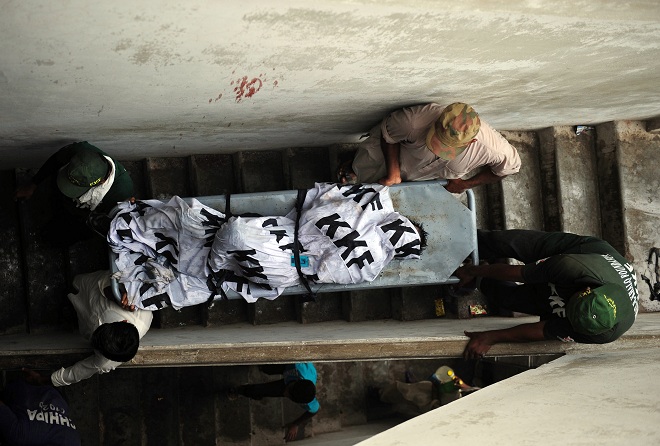SHARM EL-SHEIKH: Pakistan promised India on Thursday that it will do “everything in its power to bring the Mumbai terror attackers to justice, a key demand by New Delhi to improve relations.
The prime ministers of the two nuclear powers also agreed that action on terrorism should not be linked to their peace talks, the joint statement said, something that has been asked for by Islamabad.
Indian Prime Minister Manmohan Singh and his Pakistani counterpart Yousuf Raza Gilani met on the sidelines of the Non-Aligned Summit in Sharm El-Sheikh, in a much anticipated meeting that comes after a seven-month freeze in their peace talks due to an attack by alleged Pakistani gunmen on India’s financial capital of Mumbai that killed 166 people.
“Prime Minister Singh reiterated the need to bring the perpetrators of the Mumbai attacks to justice. Prime Minister Gilani assured that Pakistan will do everything in their power in this regard, said the statement.
The two prime ministers agreed to cooperate on the investigation into the incident, which India maintains was planned and launched from Pakistan.
“Pakistan has provided an updated status dossier on the investigations of the Mumbai attacks and (the prime minister) has sought additional information and evidence, the statement said.
The leaders also agreed that they would “share real time, credible and actionable information on any future terrorist threat.
In a move of great importance to Pakistan, the two leaders also agreed to delink their wider talks on issues such as water, demilitarization and the disputed territory of Kashmir from the discussions over terrorism.
India previously had been unwilling to continue the composite talks until its concerns over Pakistan response to terrorism had been addressed.
It was unclear exactly when the composite talks would restart, but the statement did promise that the countries’ foreign secretaries would “meet as often as necessary and the foreign ministers would meet at the upcoming UN General Assembly meeting in September.
The most important thing is that what we were hoping, for that there should be constructive engagement, (happened), said Pakistani minister of state for foreign affairs, Nawabzada Malik Amad Khan.
They decided in the future there will be constant engagement and that will help us break the deadlock, he told The Associated Press.
In India, meanwhile, Lalit Mansingh, the former foreign secretary, described the meeting as a step forward and welcomed Pakistan s commitment to go after the attackers, noting that they are scheduled to try five suspects for plotting the attacks.
These are steps forward. If there is actually a trial and we see that it is proper trial I think it would restore (India s) confidence in Pakistan, he told India s NDTV network. The prime minister is giving flexibility to Pakistan and Pakistan will be tested on that.
Earlier this month India reacted with anger when a Pakistani court ordered the release of Hafiz Mohammed Saeed, the founder of the group India blames for the Mumbai siege.
India and Pakistan have been adversaries for decades. They have fought three wars, two over the disputed territory of Kashmir, since gaining independence from Britain in 1947.
In 2001, a suicide attack on the Indian Parliament pushed them to the brink of war again, but tensions eventually subsided. They began formal peace talks in 2004, but they were put on hold after the Mumbai attacks.
India has accused Pakistani authorities of supporting militants fighting in Kashmir. India, the US and other nations have urged Pakistan to do more to curb Islamic militant groups.

